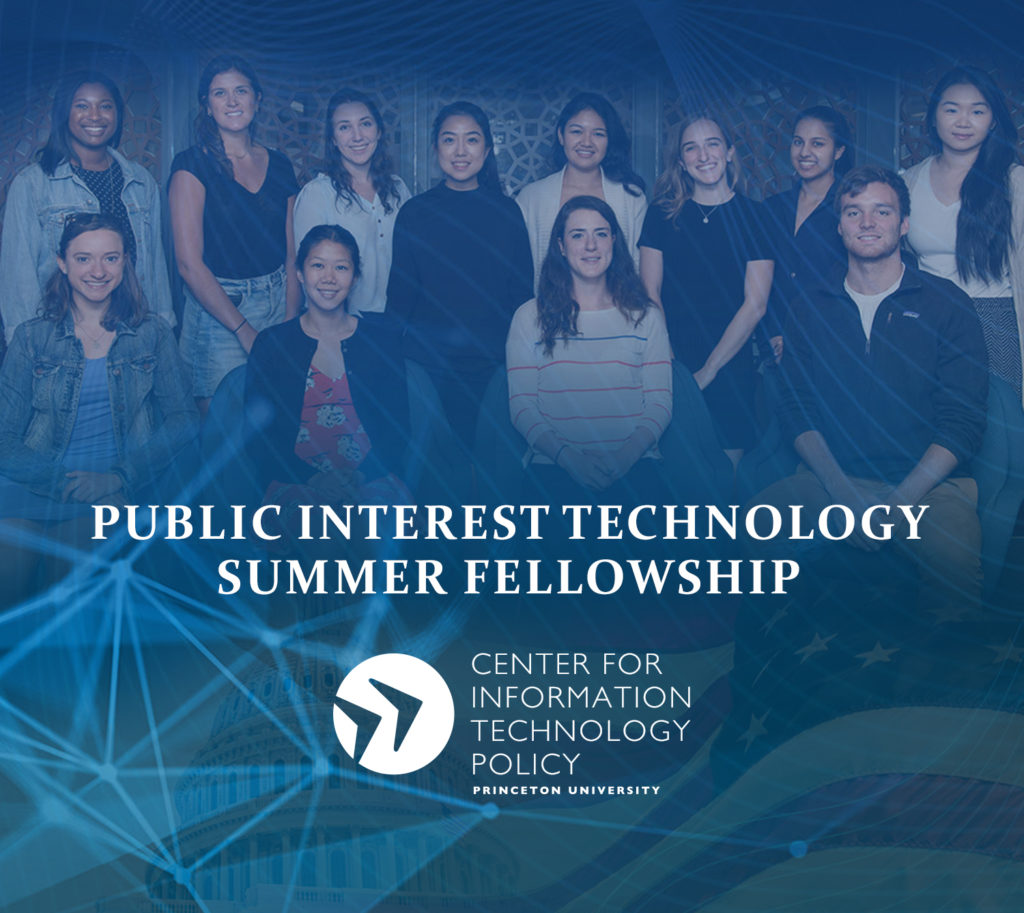
CAREER PIPELINE
AND PLACEMENT
Bloomn
ARIZONA STATE UNIVERSITY
Principal Investigators: Derrick Anderson, Associate Professor, School of Public Affairs (SPA), and Jeremy Liu, Senior Intelligence Analyst - Office of the President, Arizona State University
Bloomn, an online social impact innovation competition, community, and accelerator platform, is designed to sustainably support and inspire the next generation of public interest technologists.

Justice Media Co-Lab
BOSTON UNIVERSITY
Principal Investigator: Brooke Williams, Associate Professor of the Practice of Computational Journalism
A partnership between Boston University’s College of Communication (COM) and the new Faculty of Computing and Data Sciences (CDS), the Justice Media co-Lab engages faculty, students, and external experts in research and innovation collaborations, and curricular and co-curricular programs with the potential for real-world impact.
Sociotechnology of Cyber Security:
An Experiential Learning Course
CASE WESTERN RESERVE UNIVERSITY
Principal Investigator: Brian Gran, Professor, Department of Sociology, Law (secondary), and Applied Social Sciences (secondary)
The project will develop an interdisciplinary, experiential-learning course on cybersecurity open to all Case Western Reserve University undergraduates.

Establishing the ASRC IlluminationSpace as a Hub for Public Interest Technology, STEM Pathways, and Science Communication and Outreach at CUNY
CITY UNIVERSITY OF NEW YORK
Principal Investigator: Annette Gray, Ph.D
Over the past two years, the Advanced Science Research Center (ASRC) at the Graduate Center of the City University of New York has piloted several STEM outreach, education, and communications programs. To better serve NYC’s underrepresented communities, CUNY will bring the programs under the ASRC IlluminationSpace (IS) umbrella to create the IS Hub, focused on using PIT in four areas: K-16+ STEM education, science communication, community-based science, and STEM workforce development.

Building the CUNY PIT Lab
CITY UNIVERSITY OF NEW YORK
Principal Investigator: Katie Cumiskey, Professor/Academic Coordinator CSI St. George/CUNY
The CUNY PIT Lab will build on the field-building goals outlined by PIT-UN and help to define PIT across CUNY’s academic programming.
Community-led Public Interest Technology
CLEVELAND STATE UNIVERSITY
Principal Investigator: Kelle DeBoth, Assistant Professor, School of Health Sciences
The Hough neighborhood is an under-served community surrounding Cleveland State University (CSU) and Case Western Reserve University. This project will create a collaborative mechanism between university faculty and students as resources to Hough to identify and drive community-led PIT solutions to critical issues, such as public safety, alongside experts in the field. Building upon a pilot initiative that began two years ago, the newly formed multidisciplinary CSU T.E.C.H. Hub Center (CTHC) will be leveraged to create a new IoT Community Advisory Board (ICAB). ICAB will join community leaders and residents to work with CTHC faculty to develop novel, innovative PIT solutions to community issues.
The PIT Difference
Residents of Hough not only face socio-economic barriers to equal access to technology, but they frequently lack basic exposure to technology and its capabilities. Moreover, cultural barriers exist that have created a mistrust of many technologies, such as sensors and gathering information from public spaces. Using a community-led approach, including a diverse group of community members in leadership, the project will help to address these challenges.
Smart City Privacy & Equity Community Awareness & Empowerment
CLEVELAND STATE UNIVERSITY
Principal Investigator: Brian Ray, Professor and Director, Center for Cybersecurity and Privacy Protection
The leading civic data privacy leaders network will collaborate with computer science, social work, and law faculty to deliver a set of model resources for communities to raise awareness of the surveillance risks posed by smart city technologies.
GISEC3: Social and Urban Vulnerability
Analysis for Resilience Building
MIAMI DADE COLLEGE
Principal Investigator: Carlos Genatios, Ph.D.
Building on the existing GISEC (Geographic Information Systems for Environmental Awareness and Community Engagement) project launched in 2019, GISEC3: SURE (Social and Urban vulnerability analysis for REsilience building) will contribute to the assessment of social vulnerability and environmental risk raising awareness of the ethical and societal urgency that climate change, disasters, and resilience building require.
Ohio Public Interest Fellows
THE OHIO STATE UNIVERSITY
Principal Investigator: Elizabeth Newton, Executive Director of the Battelle Center for Science, Engineering, and Public Policy in the John Glenn College of Public Affairs
The project trains and places Ohio Public Interest Fellows in state government to grow the capacity of Ohio’s public sector and the future workforce to integrate scientific-technical insight into policymaking, and to foster a culture of dialogue and collaboration between state government and academia. These Fellows, grad students representing scientific-technical academic backgrounds, will support their host organizations’ work, develop into public-interest scientists, engineers, and analysts, and assist in critical stakeholder-discovery for the Fellow program’s planning.
The PIT Difference
By providing stipends for the fellows to remove this potential barrier to diverse participation, the project seeks to address participants’ potential confidence issues by offering preparation and training to the fellows in advance of their summer assignments, as well as promoting affiliation and a sense of belonging to the cohort. Further, OSU’s Battelle Center for Science, Engineering, and Public Policy provides direct access to mentorship opportunities.
Public Interest Technology Summer Fellowship Program
PRINCETON UNIVERSITY
Principal Investigator: Mihir Kshirsagar, Clinic Lead
The project is a continuation of a two-year-old summer fellowship program, which builds a pipeline for talented tech-minded students to work with government agencies at the federal, state, and local levels who increasingly confront high-profile challenges in managing the impact of new technologies.
The fellowship will invite students from across PIT-UN to participate in the program. The program commences with an academic boot camp led by the technology policy clinic of the Center for Information Technology Policy (CITP) with guest lectures by CITP faculty and current and former government officials. This preparatory seminar grounds students in the basics of the regulatory landscape and introduces them to the challenges ahead to allow them to hit the ground running when they embark on their 10-week internship with the host government agency.
THE PIT DIFFERENCE
“CITP is committed to building a culturally diverse community, and we are interested in receiving applications from members of groups that have been historically underrepresented in this field.”
-The Project Team


Career Launch Pad: Building a Cyber-Protection Apprenticeship
ROCHESTER INSTITUTE OF TECHNOLOGY
Principal Investigator: Justin M. Pelletier, PhD, Director, Cyber Range and Training Center, RIT Global Cybersecurity Institute
Faculty with the Global Cybersecurity Institute (GSI) at Rochester Institute of Technology will build a federally certified, Industry-Recognized Apprenticeship Program (IRAP) in cybersecurity.
Public Interest Technology California
Digital Equity (PIT-CDE)
SAN JOSE STATE UNIVERSITY
Principal Investigator: Ahoura Zandiatashbar, Assistant Professor and Spatial Analytics and Visualization Institute (SAVI) Co-Director
The Public Interest Technology California Digital Equity (PIT-CDE) project entails developing a methodology with multidisciplinary community and faculty partners that quantifies and maps digital inequity in every California neighborhood.
Summer Fellowship for Public Sector AI Governance (PS-AIG)
STANFORD UNIVERSITY
Principal Investigator: Daniel E. Ho, Professor of Law, Professor of Political Science and Senior Fellow at the Stanford Institute for Economic Policy Research
The RegLab Summer Fellowship for Public Sector AI Governance (PS-AIG) program aims to develop the next generation of public interest technologists to set standards for auditing, developing, and equitably adopting AI in the government and to directly engage on AI issues with federal and local agencies. The project includes extensive student support, such as a 10-week summer fellowship for public sector AI governance with graduate and undergrad students, a kickoff boot camp to support students in conducting research in AI governance, and ongoing mentorship from core lab members.
The PIT Difference
The PS-AIG program seeks to address a core issue in public interest technology: bias and equity in public sector artificial intelligence. The problem is dual-sided. First, government agencies face serious challenges attracting technical staff, which are required to rigorously audit AI tools. Second, technology-oriented students find the pathway to such work challenging, given public sector constraints and the sensitivity of these issues. PS-AIG addresses this mismatch to develop the next generation of public interest technology leaders.
Data and Community Science: Getting minoritized undergraduates into the field of Data Science for Public Interest
UNIVERSITY OF ARIZONA
Principal Investigator: Adriana Picoral, Assistant Professor, Career Track
A big obstacle for drawing minoritized students into data science is unawareness of what various data science careers entail. This project aims to increase awareness of what data science is, how it can improve communities, and what various careers with data science skills are available now and emerging in the future; provide professional skills training to minoritized (in terms of race, ethnicity, gender, and disability) undergraduate students pursuing a career in community-focused data science; connect local community organizations with minoritized undergraduate students for data science internships; and shed light on how community-university collaborations can increase diversity in the field of data science.
THE PIT DIFFERENCE
The University of Arizona is a Hispanic-serving institution (HSI). By offering paid summer internships locally, the project aims to attract nontraditional tech interns to PIT by engaging students enrolled in nontraditional data science introductory courses, such as WFSC 223 – Dealing With Data in the Wild and MATH 107 Exploring and Understanding Data, which do not have the prerequisite courses in calculus and linear algebra.
The Penn-CMU Digital Health Privacy Initiative
UNIVERSITY OF PENNSYLVANIA
Principal Investigator: Ari Friedman, Assistant Professor of Emergency Medicine, Medical Ethics, and Health Policy
The Penn-CMU Digital Health Privacy Initiative will grow a unique collaborative network focused on advancing research, training, and policy to address privacy and discrimination risks associated with the collection and use of health-related digital data. The project will expand on efforts to produce high-impact research on the collection and use of personal data across the online health ecosystem, recruit and train students from historically disadvantaged groups to conduct research on issues related to online privacy and discrimination, and advocate for evidence-based policy changes to enhance online privacy and equity.

The PIT Difference
The project will address inequality in the healthcare field directly by partnering with two pipeline programs with proven track records of training students from historically disadvantaged backgrounds for graduate programs and careers in computer science (the REUSE program) and health policy (the SUMR program). To ensure that students do not face a choice between paying their rent and training in PIT, the team has budgeted to cover students’ living expenses and graduate test prep. This proven mix of research experience, networking, formal training, and long-term guidance will guide these promising students toward careers in the public interest as researchers, advocates, or government employees.
Data Learning for Better Drinking Water in Small Utilities
UNIVERSITY OF MICHIGAN
Principal Investigator: Rebecca D Hardin, Associate Professor, Environmental Justice Conservation + Restoration
The project will pilot, revise, and adapt the modules for use in both professional development contexts and classrooms to generate interest in public utility careers and enhance the data skills of existing workforces.


Expanding Public Capacity for Community Cellular Networks
UNIVERSITY OF WASHINGTON
Principal Investigator: Kurtis Heimerl, Assistant Professor, Computer Science & Engineering
The project will expand community cellular network infrastructure and training programs to support digital equity within urban neighborhoods.
The Puget Sound Clinic for Public Interest Technology
at the University of Washington-Seattle
UNIVERSITY OF WASHINGTON
Principal Investigator: Nicholas Weber, Assistant Professor in the Information School
A public interest technology clinic at the University of Washington-Seattle will pilot an undergraduate course and experiential learning program focused on service projects with community-based organizations in the Puget Sound region.



